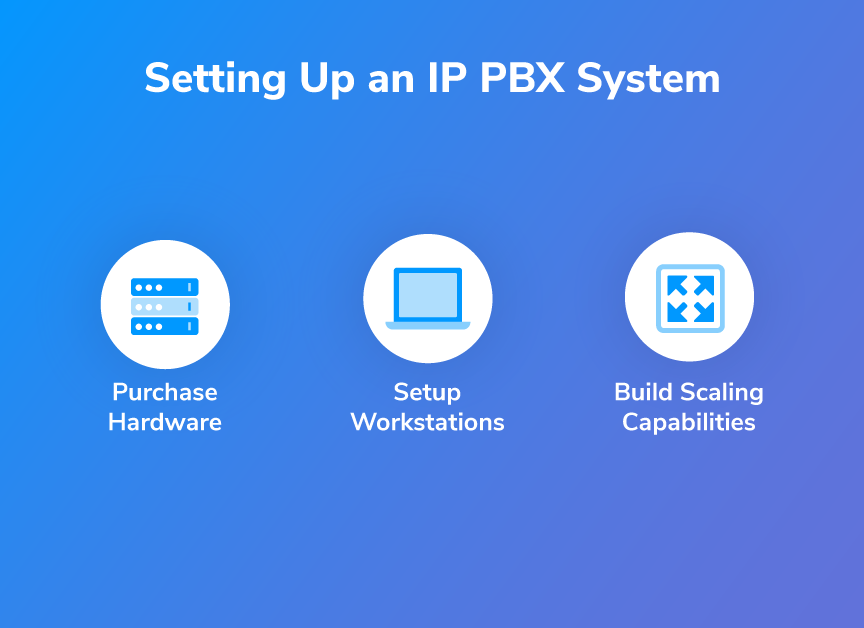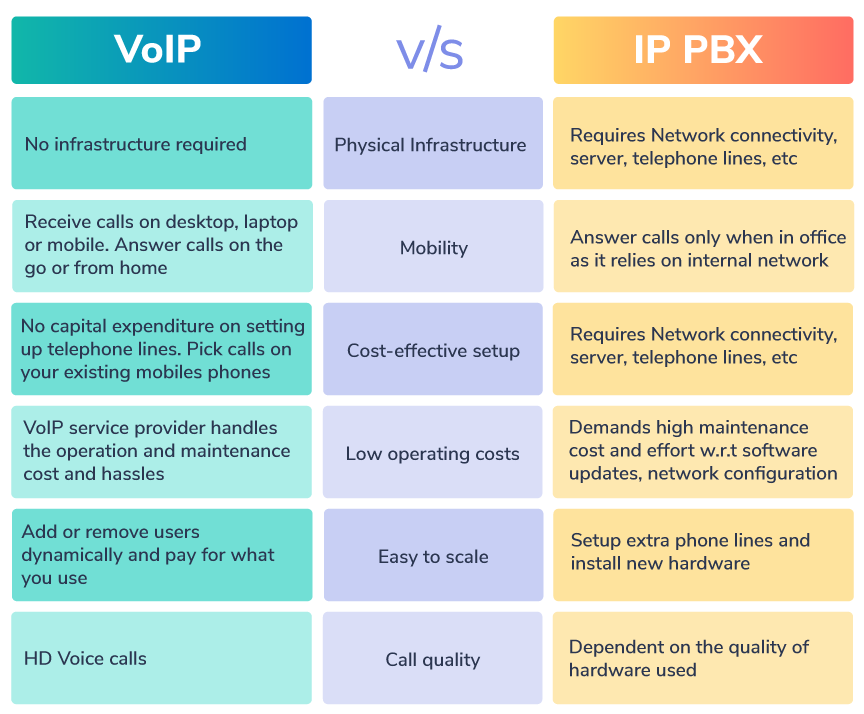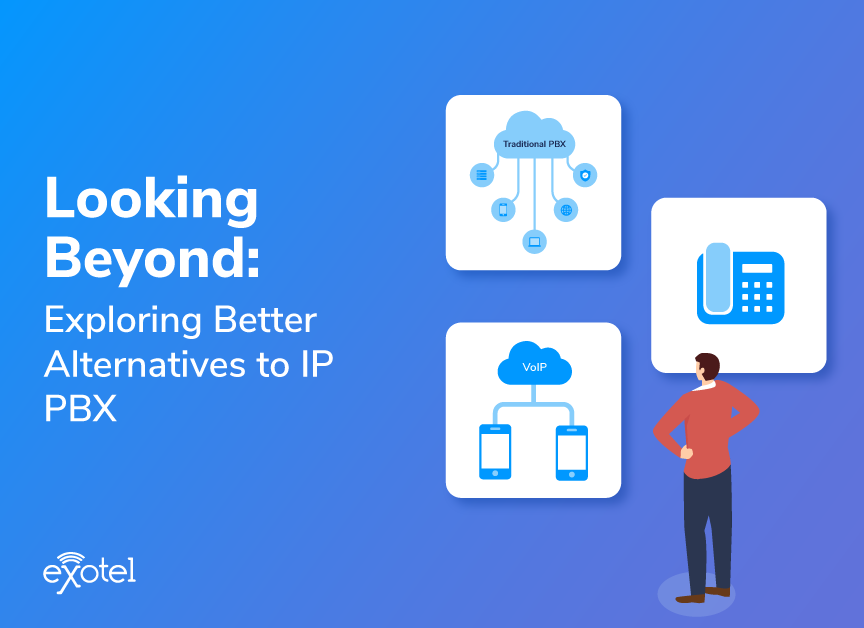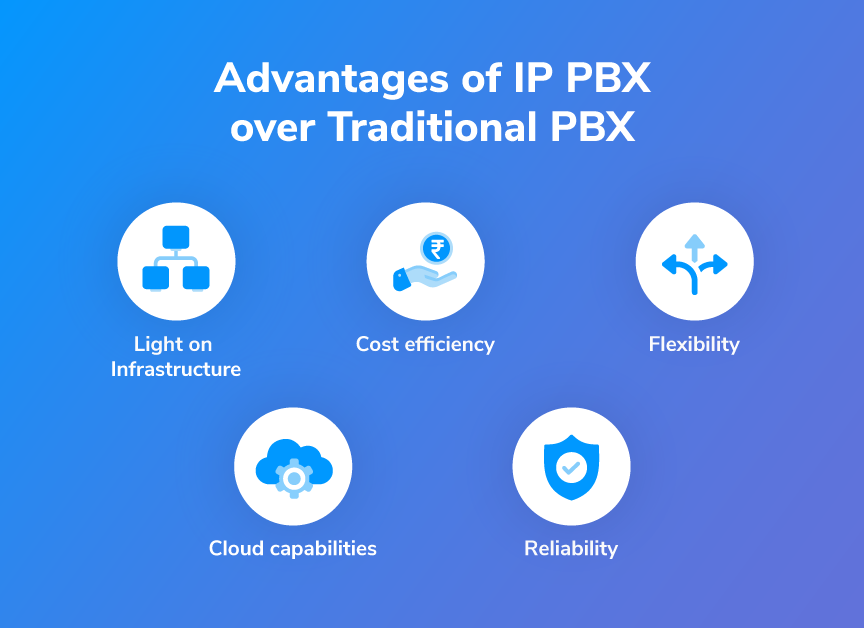Until very recently — and in many companies even now — IP PBX was being used to handle customer calls. In this blog post, we’ll explore if it is still the best option you have, the alternatives available, and how you can transition to a better solution if you choose to.
What is IP PBX?
IP PBX is an on-prem phone system that allows you to make and receive business calls over the internet. It requires businesses to buy and maintain bulky infrastructure like a PBX server, analogue telephones, etc on premises.
How does IP PBX work?
IP PBX works just like the traditional PBX network, except the calls are made and received over the internet. It converts the analog signals into digital signals and directs the calls to a VoIP operator. The VoIP operator then connects the call to the customer’s phone.
How to set up & scale an IP PBX system
To set up a functional IP PBX system, you need several hardware and software components.
1. Purchase Hardware
A central PBX system, a local server, computer with the capability to manage line switching, individual telephone devices etc. Given that this is a complex setup, you might need expert technicians to enable this.
2. Setup Workstations
Since the IP PBX-based telephone line is not portable, you must set up the workstations for your agents, keeping in mind the reasonable distance between two devices to have a comfortable conversation.
3. Build Scaling Capabilities
Unlike a scalable VoIP solution, a central PBX system or a local server will only handle a limited number of devices. So, if you’re looking to scale, you might need to replicate the system for every next set. For example, if your server capacity is 100 users, you will need to buy, implement and manage a server for every subsequent 100 users.

What is Hybrid IP PBX?
Hybrid IP PBX is a solution that combines existing on-premises implementation with the cloud. This is a commonly used way of connecting existing legacy PBX implementation to VoIP solutions. Organisations choose hybrid IP PBX because:
- The migration costs are lower than a new cloud implementation
- It connects legacy systems to VoIP
- It enables VoIP features such as call queuing, auto-attendant, etc.
- It offers disaster recovery capabilities by automatically switching to the network that is working in case the other one fails
However, even cloud implementations of IP PBX are not entirely flexible. You still need to access the phone line through the physical network in your office location. You can only make or receive calls while you’re there.
Is IP PBX suitable for small businesses?
Though an IP PBX has all the required features for a business phone system, it can be expensive. Especially for a small business, the upfront costs of infrastructure and ongoing maintenance can be prohibitive.
For instance, an IP PBX needs, at the minimum, a local server, routers, network devices, telephones, continuous power supply, and other hardware and software. The running costs of an IP PBX system include repairs, service, upgrades etc., in addition to your phone bill.
In the long run, scaling your IP PBX system will also incur additional capital expenditure. And if you’re moving from one location to another or expanding to newer sites, you might incur additional upfront costs for setting up an IP PBX in each location.
Is IP PBX suitable for enterprises?
In today’s work environment — with a big part of the workforce working from home — it is not a good idea for a large enterprise to set up an IP PBX system in their offices. This is because it:
- Restricts access to the telephone line to a physical office, which is unsuitable for field teams
- Is capital intensive, especially at enterprise scale
- Forces organisations to set up and maintain complex technology infrastructure
- Offers limited features
- Does not enable analytics and insights
How is IP PBX Better Than Traditional PBX?
Yes, in some ways. We explore them here one by one.
Light on Infrastructure: A traditional PBX solution is set up on a self-owned network within the company’s premises. It involves bulky hardware and a wide range of equipment to work effectively. This makes it expensive to procure, implement and maintain.
An IP PBX system works on your network using your existing LAN. It is easier to configure and install than the traditional PBX system. It is also simpler to make changes.
Cost efficiency: Compared to a traditional PBX system, you can reduce your average monthly operational costs using IP PBX if you have many users.
Flexibility: Unlike traditional PBX, it is easier to move phones around without going through the hassle of wiring, enabling remote extensions since they are IP-based. You will also be able to integrate the phone’s functionality with business applications, as needed.
Cloud capabilities: Traditional PBX is set up on-premise, connected to a physical network. IP PBX, on the other hand, can be set up on-premise but is connected to the cloud. It allows your PBX network to access cloud capabilities while still using the on-prem network and devices.
Reliability: Traditional PBX systems have ‘Single Points of Failure’, resulting in increased downtime that can significantly affect the business.
Is Hosted PBX better than IP PBX?
Hosted PBX is simply an IP PBX hosted on the cloud instead of on an on-premises server. Hosted PBX provides benefits like cost savings, flexibility, increased productivity etc.
- Since there is no on-premise hardware installation required, the initial investment and set-up costs are a fraction of the costs involved in IP PBX.
- Since it’s cloud-based, the solution is often pay-as-you-go, and therefore, operational costs are also lower.
- It frees your IT teams from the stress of monitoring and maintaining the infrastructure
- It allows you to encrypt calls for better security
- It has faster disaster recovery protocols, minimising downtime
Is VoIP better than IP PBX?
Yes, by a significant margin. Here’s why.
You don’t need much physical infrastructure with VoIP. This means that, unlike PBX, you don’t need to set up a network, server, telephone lines etc., in your office. Therefore, you don’t need to hire experts to procure and install the technology either.
You can make calls anywhere anytime. VoIP calls can be made or received from a mobile phone or a laptop enabling agents to connect with customers anytime. This empowers support and sales teams to work from home, field teams to communicate while they’re on the move and delivery teams to securely connect with customers.
VoIP is cost-effective to set up. It has no capital expenditure, perhaps other than the mobile devices needed to make or receive calls. Here too, you can make do with your existing mobile phones or computers. This makes it cost-effective to adopt and scale.
It incurs low operating costs. Given that the VoIP service provider maintains the entire infrastructure, including network, interface etc., costs of operations and maintenance are minimal.
It is easy to scale. With VoIP, you can easily add or remove users dynamically without prohibitive costs.
It offers a wide array of features. A comprehensive VoIP solution provides a lot more than just making and receiving calls. This includes conditional call routing, live agent dashboards, analytics and more.
It offers better call quality. Internet-based calls have long had a bad rap for being low-quality or intermittent. However, VoIP solutions today offer HD quality voice calls, often better than regular phone calls.

Is IP PBX a worthwhile investment in 2022?
With advancement in technology, the customer communication landscape has evolved way beyond IP PBX. In today’s world, IP PBX is an ineffective solution for an organisation’s communications needs for several reasons:
- It incurs too much capital expenditure
- It is inflexible and not accessible remotely
- It has limited monitoring and analytics capabilities
- It restricts dynamic scalability
- It doesn’t integrate easily with other tools
Today, there are more powerful, flexible, secure and cost-effective communication solutions in VoIP and cloud telephony.
To know more about how and why you should invest in a VoIP service for your business, set up a call with Exotel today!



 +65-6951-5460
+65-6951-5460 +91-8088919888
+91-8088919888 +1-(718) 354-8866
+1-(718) 354-8866 +62-215-098-4960
+62-215-098-4960 +60-3-2771-2799
+60-3-2771-2799 +61-2-8073-0559
+61-2-8073-0559
No Comments